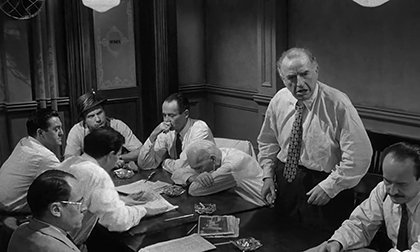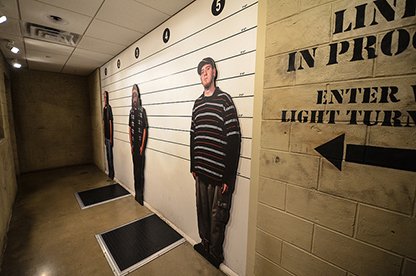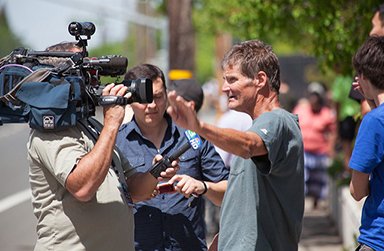Eyewitness Accounts are Often Distorted by the Views of Others
Are we always honest as an eyewitness in our recollection of events? It's known that eyewitness accounts are unreliable in general. People can falsely recall or remember things, get things mixed up, or even outright lie.

12 Angry Men
The movie 12 Angry Men is great, and shows that some of the eyewitness accounts used to try to convict a boy of a crime, were inaccurate and false. The actual events were misrepresented by several testimonies due to various reasons. One older woman couldn't have seen what she said she saw, but she made it up to get attention. Another witness couldn't have heard what they heard. And that's just for witnessing something alone.
What happens when we witness something with others around us, and we all talk about what we saw afterwards? How accurate are our accounts then?
We all are influenced by those around us, parents, fiends, the media, etc. But those who are closest to us and that we identify with the most have more of an influence on us. When some people tell us things, we pay more attention and give more value, weight or importance to what they say. We can also put more weight into how true or accurate what they are telling us is. We believe in what they say because they have our trust, loyalty and faith in them.
Even if we don't know the people, we are still influenced by what others do. We tend to conform to the group, to be an inclusive part of the collective and follow with the group-think to fit in. Looking at the Asch conformity experiments, we can see how easily people are influenced into collective group-think conformity. Some new research has looked into how problematic this is in terms of using eyewitness accounts for criminal cases. There can be miscarriages of justice to falsely convict or acquit people.
To test how reliable eyewitness accounts are when shared among groups of people, Dara Mojtahedi showed a violent incident to volunteers acting as witnesses. When people were allowed to talk about the video and what they saw, many other people's own recollection of events was distorted by what others were saying. Like in the Asch conformity tests, there were dummy witnesses planted to suggest wrong accounts of what happened.
The experiment had 420 people that also included some preexisting relations to other people for at least 3 months. Those who had discussions with others had more statement similarity when they later gave individual statements of recollection. Even if many people see the same thing, they talk about it differently. But after sharing accounts, they tend to say more of the same things, like a rehearsed statement.
We are very susceptible to the influence of others. I have posted about this before, but everything that happens, visual or auditory, will influence us. Everything we take in throughout our lives has an affect upon us. When it comes to those closer to us, we are even more influenced by what they have to say. Those we have trust, faith, loyalty and belief in will have us think they are more likely to be correct than a stranger we don't have that faith in. We spend less time questioning the accuracy of those we trust, and are more easily swayed by what they have to say.
This research can help refine police and court procedures with respect to eyewitness accounts. Taking into consideration the degree of co-witness familiarity (i.e. having a prior relationship) will factor into how reliable someone's own account is. It's not just what someone says that needs to be asked, but also did you witness something alone; with friends or family; or with complete strangers; and did you talk about it with each other afterwards?


As always, interesting perspective. I love that movie and some of my colleagues think I am crazy for liking such an old movie but it is one of the greatest movies.
Another movie that I had recommended (and would recommend to someone like you) is Thank you for Smoking. It lays out eloquently what media can do to us without us realizing and the value of human life from 'corporates' view point(not in a conspiracy theory way).
We do not see the world with eyes, we see it with minds and what is mind? A mish-mash-pile of memories. These memories are always filled with familiarity, because we always cling to the familiar.
If in the arena of 'our familiarity' something is believed to be true - we tend to see the world with those lenses. For example, if you are raised by parents who believe certain ethnic group are 'bad people', you are likely to carry that until the day you actually get to KNOW 'otherwise' on your experience and a NEW memory is added which changes the 'view' of your mind.
Upvoted.
I don't know many black/white movies, but that one is good for the psychology/morality. Good story, all you need is 12 people and one room :)
Yeah I saw that Eckhart movie years ago. I'll have to see about watching it again, thanks ;)
We are definitely social conditioned by the current condition of the environment we are in, parents, friends, media, etc. That's why until we live the self-examined life, reflection, contemplation, then we are not really living life ourselves but are running of unconscious automated conditioned influences that we have not questioned and verified ourselves. Thanks for the feedback.
I'm glad I found your post amongst the thousands of others in the sea of Steemit. I have to say, you are one of the most insightful writers I've read on steemit thus far.
We are social creatures and by our instinct nature, we tend to trust people easily, especially if we perceive them to have higher authority than us (ie. qualifications, diplomas, experience, etc.) However, our trust can be easily swayed and abused if our perceptions of our authority figures do not match the reality. While it's important to question our beliefs, but not all of us have the luxury of time to engage in such a time-consuming process.
I'd like to highlight that blockchain technology helps to bridge the trust gap so we can trust the system without trusting the people. I wonder if the technology can go even further to help us reduce our inherent herd mentality thinking.
Well blockchain only makes it so that the data is tamper-proof, not that it is accurate infromation, or that a contract will be honored. It's trustless in that you don't need a third party to verify or notarize things, as the blockchain does it.
Indeed, the inherent position is to trust by default, to a certain extent, and the degree greatly increases on perceived images that convey more trust in some areas as you mention. Thanks for the great feedback.
Many "law enforcement" people are already aware of these behavioral tendencies.
Witnesses can very easily be "helped" to remember things that never actually occurred, especially when the helpers are over-zealous public service authority figures.
The Innocence Project
DNA testing is being increasingly used to overturn convictions of people who were often identified by eyewitnesses.
Indeed, coaching the witness. Lawyers have that issue too ;)
I've seen instances on one or two news shows where the interrogation tapes show the police feeding information to a witness that wasn't made public through leading questions.
I doubt the witness even realized it.
It can be very damning "evidence".
@krnel - You hit the nail right on the head Sir! I can not even recall details of my own emergency situations a few days later - even though I have obviously faced the music so the details should be imprinted on my memory. I wonder how people swear to recalling minutest details even months after the incident. I think their so called 'recall' is all based on perceptions. I believe that human brain does progressively forget things, perhaps to keep things uncluttered - unless a specific effort is made to commit things to long term memory. I am also amused to see that the moment I read the first line of the blog, I thought about a regional language movie but based on '12 angry men!!' So - my train of thought did match yours for a moment though I am a layman and you are the expert. :)
Thank you for sharing your views through this blog. Upvoted
I went on am early morning photography and bird outing today to shake off my Monday blues. Have written a blog with collages of some nice birds (made with my original photos). I request you to take a look and let me know your views. Your comments will be eagerly awaited. Thanks
We do forget things, and not recall everything, not store all detail in memory as it takes up too much "space", it's useless pretty much. Older info fades in vividness compared to new as well. I'm no expert though ;) Thanks for the feedback.
Considering without eyewitness reports we would have so many incidents/accidents or whatever has happened...they are so valueable to figuring out the truth which is unknown in most cases. Good to know there are plenty of researches being conducted to this
Yeah, the best option to resolve that is decentralized camera networks with complete public access for anyone to verify any claim about something done. Veracity is truth.
That would be a solution for sure but a tricky one though...worldwide cctv? Even in private places? That would for sure raise a few complaints :p
No, public places, lol, not private places ;)
Great read. If you Google around (I couldn't find it) there's an article written by a women (I think) who was on jury duty giving her account of how fucked up it was. She relates to 12 angry men in it as well.
Yeah it must be surreal when everyone doesn't care or just wants to convict some person that you think is innocent. Like damn...
There was a great experiment in the UK that was turned into a TV program, can't find the video unfortunately Here is the synopsis:
Aha found it, this is the second part where they get the eyewitness testimony
Thanks for adding this. I wonder if self-awareness or greater cognitive development aids in recollection accuracy.
probably not... In accident investigation it is also a notorious weak element even professionals at the time of high stress have a kind of "tunnel vision" everything not perceived as relevant at the time is washed away. Later on people add demonstrably false details. Not because they are bad intentioned. For example with people who witness an aircraft crashing, there is always someone who swears the engine is on fire. Even if engines had nothing to do with it. It is just the stereotypical picture on the news and our brains kind of fill in the blanks when details aren't there...
Damn, that sucks. Our anchoring or focus effect bias results in less retained data at the time and more filling in later. But that would be for extraneous things they didn't actually see. A proper recollection of events would probably have them clear up what actually happened where they realize they didn't see the engine on fire. If asked about the specific things they did see, I would think that is more accurate since they actually did focus on it at the time. Our best option is to always have a camera, then we can verify what happened lol ;)
That's why evidence is more important than personal testimony and many jurisdictions have that implied into their laws around the world.
Yup. Trust is easy to manipulate, not enough to send someone to live in a cage. Not that sending people to a cage is a solution at all...
An important thing to recognize, and something many are just not aware of. Most of us - probably all of us - have false or at least misleading memories of some form. I know for a fact I "remember" things from my childhood that actually happened to friends.
There's good reason we rarely put anyone in jail on eyewitness accounts alone nowadays.
Yeah, not on eyewitness account alone. But people can testify as to what happened.
Gotta say 12 angry men is classic and a must watch!!